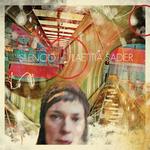
Laetitia Sadier Silencio
(Drag City)
When an artist lives in the shadow of a great band, you can imagine that it takes a great deal of effort not to feel overwhelmed by the pressure to conform to fan expectations when that artist strikes out on their own, either because the band has disbanded or because the artist just feels a need to try something different. Laetitia Sadier is no stranger to these kinds of expectations. She made her name through the seminal electronic pop group Stereolab and its dozens of LPs, b-side collections, and musical minutiae of which the band was so especially fond. As fans, we’ve come to know her strengths and weaknesses and what we expect of her (yes, even those of us who feel a particular kinship with our favorite artists can’t help but have these expectations).
On her previous solo outing The Trip, she mixed the electronic experimentation of Stereolab with her own love of pop balladry and came away with an album of interesting if flawed ideas. Unfortunately, Silencio only further exacerbates this feeling of disconnect with the listener. There are moments of exacting clarity when Sadier completely understands and executes what she seems to be hearing in her own head but those periods of creative drive are short-lived at best. The album does open with a one-two punch of some of her best ideas though. The Rule of the Game comes on strong in a similar fashion to some of the more energetic moments contained in the works of her previous band. We even get a last minute pop breakdown that feels especially propulsive alongside the electric guitars and gentle electronics. Lead single and follow-up track Find Me the Pulse of the Universe is quintessential Stereolab-lite and I’m not using that term in a derogatory fashion, at least not in this instance. The song creates a soothing, swaying home for Sadier’s particularly effective vocals, and she seems to know her place in the song. Her vocals, while the principle force of movement in the song, are not so distracting as to pull you away from the creative and unique instrumentation. These two songs create an intriguing and hopeful start to the album.
And while subsequent songs like Silent Spot and Auscultation to the Nation are pleasant enough diversions, they really lack the spark that fueled the first two songs. It also doesn’t help that some of the lyrics in Auscultation to the Nation feel as though they were written by a middle school student writing an essay about the need for a true democracy in America. This uncharacteristic political divergence feels misplaced and shoehorned into what is otherwise a perfectly serviceable pop song. And that’s the problem with Silencio—these songs are all, for the most part, perfectly adequate, but we’ve heard better and stronger songs from Sadier before. It’s not so much a sucker punch as a blunt disappointment from an artist who we know can do so much better. And she knows it too.
Other songs like Between Earth and Heaven and Fragment pour le future de l’homme fare better, mostly due to their relative similarity to her earlier work. Even the obvious French influences concerning her use of samba and bossa nova beats, while seeming natural on previous outings, feels a bit superfluous here as she relies more heavily on traditional pop construction. Sonically, there’s a lot of comparison to be drawn with her previous album, as she still uses that reliance on pop mechanics to balance out the more abstract use of electronic sounds. The album's nadir comes in the form of closing song, if it can even be called that, Invitation au Silence. This music-free treatise from Sadier calling for a return to silence of sorts comes across as completely unnecessary and slightly insulting to her fans, as it’s used as a kind of blunt-force trauma sermon. It’s a shame that the album feels slightly front loaded as it makes the ending sound that much worse.
To be fair, it’s difficult to come down too hard on the album as it does sound like a Laetitia Sadier album, and if that’s all you’re looking for, then you’ll be pleased. The problem that I had with the record is that it only sounds like an adequate Laetitia Sadier album and nothing more. There is no growth here from her last record. There are only borrowed bits from her past albums, and with an artist as talented as she is, that’s just lazy. I know it seems as though I didn’t enjoy the album, but really I’m more frustrated and disappointed regarding the lack of any real innovation or creative drive than I am ready to dismiss the album as a whole. This is Sadier on autopilot. I’m just waiting for her to take control again.
